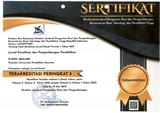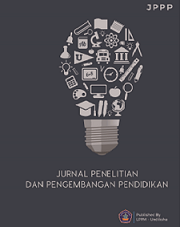Islands Education Studies and Challenges in Learning Science
DOI:
https://doi.org/10.23887/jppp.v7i1.55810Keywords:
Islands Education, Science Learning, Curriculum 2013, ThematicsAbstract
Learning science in the archipelago has challenges and obstacles even though there has been a change in curriculum. The problem in this study is how science is taught in the context of the KBK, KTSP and K-13 curricula. The aims of this research is to develop the curriculum from the KBK to the 2013 Curriculum in science learning. Qualitative research was carried out using case studies to check conditions through in-depth interviews with informants. The informants involved were teachers and principals at 17 elementary schools as well as the head of the local education office. Data collection was carried out through structured interviews with informants. The research instrument was an interview question sheet containing approximately 7 question items developed by the researcher based on the research objectives. Data analysis was carried out qualitatively through reduction, data display, and conclusion. The research findings show that 80% of informants prefer science learning to be managed separately from other lesson content. Although each curriculum has advantages and limitations. This is considered more effective in ensuring a broader and deeper understanding of the science concept. In addition, it was also revealed that the availability of facilities and teacher competence are factors that support the success of learning science in elementary schools. For future researchers, it is recommended that learning and curriculum be designed by showing partiality to subject matter and not combining one field of science with another.
References
Alake-Tuenter, E., Biemans, H. J. A., Tobi, H., Wals, A. E. J., Oosterheert, I., & Mulder, M. (2012). Inquiry-based science education competencies of primary school teachers: a literature study and critical review of the american national science education standards. International Journal of Science Education, 34(17), 2609–2640. https://doi.org/10.1080/09500693.2012.669076. DOI: https://doi.org/10.1080/09500693.2012.669076
Alfiana., & Fathoni, A. (2022). Kesulitan Guru dalam Menerapkan Pembelajaran IPA Berbasis Etnosains di Sekolah Dasar. Jurnal Basicedu, 6(3), 5721–5727. https://doi.org/10.31004/basicedu.v6i4.3123. DOI: https://doi.org/10.31004/basicedu.v6i4.3123
Alhamuddin. (2014). Sejarah Kurikulum di Indonesia [History of Curriculum in Indonesia. Nur El-Islam, 1(2), 48–58. https://www.neliti.com/publications/226468/sejarah-kurikulum-di-indonesia-studi-analisis-kebijakan-pengembangan-kurikulum.
Alpha Amirrachman, R. (2014). Education in the conflict-affected Moluccas local tradition, identity politics and school principal leadership. South East Asia Research, 22(4), 561–578. https://doi.org/10.5367/sear.2014.0235. DOI: https://doi.org/10.5367/sear.2014.0235
Batlolona, J. R., Leasa, M., Papilaya, P. M., Jamaludin., T., & J. (2022). Exploration of Students’ Conceptual Understanding and Ethnophysics: A Case Study of Tifa In The Tanimbar Islands, Indonesia. Jurnal Penelitian Pendidikan IPA, 8(6), 2717–2727. https://doi.org/10.29303/jppipa.v8i6.2154. DOI: https://doi.org/10.29303/jppipa.v8i6.2154
Behaghel, L., Chaisemartin, C. d., & Gurgand, M. (2017). Ready for dormitory-based school? The effects of a dormitory-based school for disadvantaged students. American Economic Journal: Applied Economics, 9(1), 140–164. https://doi.org/10.1257/app.20150090. DOI: https://doi.org/10.1257/app.20150090
Carrier, S. J., Thomson, M. M., Tugurian, L. P., & Stevenson, K. T. (2014). Elementary science education in classrooms and outdoors: stakeholder views, gender, ethnicity, and testing. International Journal of Science Education, 36(13), 2195–2220. https://doi.org/10.1080/09500693.2014.917342. DOI: https://doi.org/10.1080/09500693.2014.917342
Dewantara, K. A. ., Artini, L. ., & Wahyuni, L. G. . (2022). Reading Related Activities in English Textbook and How the Texts are Exploited in the Classroom. Journal of Education Research and Evaluation, 6(3). https://doi.org/10.23887/jere.v6i3.48583. DOI: https://doi.org/10.23887/jere.v6i3.48583
Dorph, R., Shields, P., & Tiffany-Morales, J. (2011). High hopes—few opportunities: The status of elementary science education in California: Strengthening science education in California. Center for the Future of Teaching and Learning at WestEd (ERIC Document). https://eric.ed.gov/?id=ED525732.
Ernawati., & Safitri, R. (2017). Analisis Kesulitan Guru Dalam Merancang Rencana Pelaksanaan Pembelajaran Mata Pelajaran Fisika Berdasarkan Kurikulum 2013 di Kota Banda Aceh. Jurnal Pendidikan Sains Indonesia, 5(2), 49–56. https://doi.org/10.24815/jpsi.v5i2.9817. DOI: https://doi.org/10.24815/jpsi.v5i2.9817
Faisal, & Martin, S. N. (2019). Science education in Indonesia: Past, present, and future. Asia-Pacific Science Education, 5(1), 1–29. https://doi.org/10.1186/s41029-019-0032-0. DOI: https://doi.org/10.1186/s41029-019-0032-0
Fenanlampir, A., Batlolona, J. R., & Imelda, I. (2019). The struggle of Indonesian students in the context of TIMSS and Pisa has not ended. International Journal of Civil Engineering and Technology, 10(2), 393–406. https://www.academia.edu/download/58581048/IJCIET_10_02_042.pdf.
Fries-Gaither, J., & Lightle, K. (2011). Penguins and polar bears integrates science and literacy. Science, 331(6016), 413–414. https://doi.org/10.1126/science.1196976. DOI: https://doi.org/10.1126/science.1196976
Genç, K. E., Kaya, S., & Kumtepe, A. (2009). The effects of kindergarten experiences on children’s elementary science achievement. Elementary Education Online, 8(3), 978–987. https://earsiv.anadolu.edu.tr/xmlui/handle/11421/11465.
Gonsalez, P., Williams, T., Jocelyn, L., Roey, S., Kastberg, D., & Brenwald, S. (2009). Highlights from TIMMS 2007. Mathematics and science achievement of U.S. fourth and eight-grade students in an international context. National Centre for Education standards. https://eric.ed.gov/?id=ed503625.
Gozali, C., Luschei, T. F., Diki, D., & Yukamana, H. (2019). Indonesia Mengajar: An investment in hope. Educational Research for Policy and Practice, 18(3), 241–261. https://doi.org/10.1007/s10671-019-09246-5. DOI: https://doi.org/10.1007/s10671-019-09246-5
Hadi, R., Wahyudin, U., Ardiwinata, J. S., & Abdu, W. J. (2015). Education and microfinance: an alternative approach to the empowerment of the poor people in Indonesia. SpringerPlus, 4(1), 1–9. https://doi.org/10.1186/s40064-015-0995-6. DOI: https://doi.org/10.1186/s40064-015-0995-6
Hakim, L. (2017). Analisis Perbedaan antara Kurikulum KTSP dan Kurikulum2013. Jurnal Ilmiah Didaktika, 17(2), 280–292. https://doi.org/10.22373/jid.v17i2.1644. DOI: https://doi.org/10.22373/jid.v17i2.1644
Hendayana, Y. (2021). Program kampus merdeka ajak mahasiswa indonesia menjadi SDM kreatif dan adaptif (The independent campus program invites Indonesian students to become creative and adaptive human resources). https://dikti.kemdikbud.go.id/kabar-dikti/kabar/program-kampus-merdeka-ajak-mahasiswa-indonesia-menjadi-sdm-kreatif-dan-adaptif/.
Hill, H. (2021). What’s happened to poverty and inequality in indonesia over half a century? Asian Development Review, 38(1), 68–97. https://doi.org/10.1162/adev_a_00158. DOI: https://doi.org/10.1162/adev_a_00158
Irnidayanti, Y., Maulana, R., Helms-Lorenz, M., & Fadhilah, N. (2020). Relationship between teaching motivation and teaching behaviour of secondary education teachers in Indonesia (Relación entre la motivación docente y el comportamiento docente en profesores de educación secundaria en Indonesia. Infancia y Aprendizaje, 43(2), 271–308. https://doi.org/10.1080/02103702.2020.1722413. DOI: https://doi.org/10.1080/02103702.2020.1722413
Kempa, R., Ridi, E., Batlolona, J. R., & Laurens, T. (2019). Evaluating equitable distribution of teacher in Southwest Maluku regency, Indonesia. Journal for the Education of Gifted Young Scientists, 7(4), 1–30. https://doi.org/10.17478/jegys.573546. DOI: https://doi.org/10.17478/jegys.573546
Leasa, M., Batlolona, J. R., & Talakua, M. (2021). Elementary students ’ creative thinking skills in science in the Maluku Islands, Indonesia. Creativity Studies, 14(1), 74–89. https://doi.org/10.3846/cs.2021.11244. DOI: https://doi.org/10.3846/cs.2021.11244
Leasa, M., & Corembima, A. D. (2017). The effect of numbered heads together (NHT) cooperative learning model on the cognitive achievement of students with different academic ability. IOP Conf. Series: Journal of Physics: Conf. Series, 795, 12071. https://doi.org/10.1088/1742-6596/795/1/012071. DOI: https://doi.org/10.1088/1742-6596/795/1/012071
Lewis, B. D., & Pattinasarany, D. (2011). The cost of public primary education in Indonesia: Do schools need more money? Education Economics, 19(4), 397–410. https://doi.org/10.1080/09645290903358397. DOI: https://doi.org/10.1080/09645290903358397
Liliawati, W., Rusnayati, H., Purwanto, & Aristantia, G. (2018). Implementation of STEAM Education to Improve Mastery Concept. IOP Conference Series: Materials Science and Engineering, 288(1). https://doi.org/10.1088/1757-899X/288/1/012148. DOI: https://doi.org/10.1088/1757-899X/288/1/012148
Mansour, N. (2009). Science Teachers’ beliefs and practices-issues, implications and research agenda. International Journal of Environmental & Science Education, 4(1), 25–48. https://eric.ed.gov/?id=EJ884384.
Martin, A. J., Burns, E. C., Kennett, R., Pearson, J., & Munro-Smith, V. (2021). Boarding and day school students: a large-scale multilevel investigation of academic outcomes among students and classrooms. Frontiers in Psychology, 11, 1–19. https://doi.org/10.3389/fpsyg.2020.608949. DOI: https://doi.org/10.3389/fpsyg.2020.608949
Martin, A. J., Papworth, B., Ginns, P., & Liem, G. A. D. (2014). Boarding school, academic motivation and engagement, and psychological well-being: a large-scale investigation. American Educational Research Journal, 51(5), 1007–1049. https://doi.org/10.3102/0002831214532164. DOI: https://doi.org/10.3102/0002831214532164
Mercer, J. A. (2015). Pastoral care with children of war: a community-based model of trauma healing in the aftermath of Indonesia’s religious conflicts. Pastoral Psychology, 64(6), 847–860. https://doi.org/10.1007/s11089-015-0654-4. DOI: https://doi.org/10.1007/s11089-015-0654-4
Nurtanto, M., Kholifah, N., Masek, A., Sudira, P., & Samsudin, A. (2021). Crucial Problems in Arranged The Lesson Plan of Vocational Teacher. International Journal of Evaluation and Research in Education (IJERE), 10(1), 345–354. https://doi.org/10.11591/ijere.v10i1.20604. DOI: https://doi.org/10.11591/ijere.v10i1.20604
Ozgur, S. D., & Yilmaz, A. (2018). An investigation of pre-service chemistry teachers’ learning approaches and inorganic chemistry achievements. European Journal of Educational Research, 7(3), 731 – 738. https://doi.org/10.12973/eu-jer.7.3.731. DOI: https://doi.org/10.12973/eu-jer.7.3.731
Parker, L. (2017). Religious environmental education? The new school curriculum in Indonesia. Environmental Education Research, 23(9), 1249–1272. https://doi.org/10.1080/13504622.2016.1150425. DOI: https://doi.org/10.1080/13504622.2016.1150425
Peristiwo, H. (2020). Curriculum Redesign of sharia economic through integration of science towards independent learning and independent campus at the state islamic university of sultan maulana hasanuddin banten. Al Qalam, 37(2), 85–100. https://doi.org/10.32678/alqalam.v37i2.3651.
Rahabav, P., Sangaji, I., Tahapary, P., & Aponno, E. N. (2021). Teacher-Equalization-policy implementations in maluku province. Proceedings of the International Conference on Educational Sciences and Teacher Profession, 532(532), 362–371. https://doi.org/10.2991/assehr.k.210227.061. DOI: https://doi.org/10.2991/assehr.k.210227.061
Rahim, M., & Hulukati, W. (2021). Development of handbooks of guidance and counseling to enhance elementary school teachers’ competence in cultivating students’ creativity. European Journal of Educational Research, 10(2), 657–670. https://doi.org/10.12973/eu-jer.10.2.657. DOI: https://doi.org/10.12973/eu-jer.10.2.657
Rahmadi, I. F. (2020). Pendidikan di daerah kepulauan terpencil: potret siswa, guru, dan sumber belajar [Education in remote island areas: portraits of students, teachers and learning resources. Jurnal Pendidikan Edutama, 7(1), 75–84. http://download.garuda.kemdikbud.go.id/article.php?article=1648657&val=15032&title=Pendid.ikan di Daerah Kepulauan Terpencil Potret Siswa Guru dan Sumber Belajar. DOI: https://doi.org/10.30734/jpe.v7i1.756
Raihani, R. (2017). Education for multicultural citizens in Indonesia: policies and practices. Compare, 48(6), 992–1009. https://doi.org/10.1080/03057925.2017.1399250. DOI: https://doi.org/10.1080/03057925.2017.1399250
Ratumanan, T. G., & Laurens, T. (2016). Analisis penguasaan objek matematika. Jurnal Pendidikan Matematika Raflesia, 1(2), 146–154. https://doi.org/10.33369/jpmr.v1i2.4005.
Richardson, C., & Mishra, P. (2018). Learning environments that support student creativity: Developing the SCALE. Thinking Skills and Creativity, 27, 45–54. https://doi.org/10.1016/j.tsc.2017.11.004. DOI: https://doi.org/10.1016/j.tsc.2017.11.004
Rogan, J. M., & Grayson, D. J. (2014). International Journal of Science Towards a theory of curriculum implementation with particular reference to science education in developing countries. International Journal of Science, October 2014, 37–41. https://doi.org/10.1080/09500690210145819. DOI: https://doi.org/10.1080/09500690210145819
Rosser, A., & Joshi, A. (2013). From user fees to fee free: the politics of realising universal free basic education in Indonesia. Journal of Development Studies, 49(2), 175–189. https://doi.org/10.1080/00220388.2012.671473. DOI: https://doi.org/10.1080/00220388.2012.671473
Rumahlatu, D., Huliselan, E. K., & Takaria, J. (2016). An analysis of the readiness and implementation of 2013 curriculum in the west part of Seram District, Maluku Province, Indonesia. International Journal of Environmental and Science Education, 11(12), 5662–5675. https://eric.ed.gov/?id=EJ1115675.
Sion, I. W., Setijopradjudo., & Achmadi, T. (2012). Analisis pengembangan pendidikan wilayah kepulauan berbasis transportasi laut. Jurnal Teknik ITS, 1(1), 47–50. https://doi.org/10.12962/j23373539.v1i1.386.
Stefanski, A. J., Martin, N. M., & Zurcher, M. A. (2019). Science-Literacy integration: equity and learning in first-grade, urban instructional contexts. Journal of Educational Research and Practice, 9(1), 104–123. https://doi.org/10.5590/JERAP.2019.09.1.08. DOI: https://doi.org/10.5590/JERAP.2019.09.1.08
Tan, M., & Bodovski, K. (2020). Compensating for family disadvantage: an analysis of the effects of boarding school on chinese students’ academic achievement. FIRE: Forum for International Research in Education, 6(3), 36–57. https://doi.org/10.32865/fire202063224. DOI: https://doi.org/10.32865/fire202063224
Virmani, R. K. (2019). Investigating How Rehearsals and Teacher Educator Feedback Influences Preservice Teacher Development. In Handbook of Research on Flied-Based Teacher Education. IGI Global (p. 22). https://doi.org/10.4018/978.-1-5225-6249-8.ch026.
Widiyono, A., Irfana, S., & Firdausia, K. (2021). Implementasi merdeka belajar melalui kampus mengajar perintis di sekolah dasar. Metodik Didaktik: Jurnal Pendidikan Ke-Sd-An, 16(2). https://doi.org/10.17509/md.v16i2.30125.
Yunianto, T., & Rokhimawan, M. A. (2021). Analisis kesesuaian materi ipa dalam buku siswa kelas iv semester 1 sd/mi dengan kurikulum 2013. Eduhumaniora: Jurnal Pendidikan Dasar, 13(1), 43–51. https://doi.org/10.17509/eh.v13i1.22237. DOI: https://doi.org/10.17509/eh.v13i1.22237
Downloads
Published
How to Cite
Issue
Section
License
Copyright (c) 2023 Marleny Leasa

This work is licensed under a Creative Commons Attribution-ShareAlike 4.0 International License.
Authors who publish with the Jurnal Penelitian dan Pengembangan Pendidikan agree to the following terms:
- Authors retain copyright and grant the journal the right of first publication with the work simultaneously licensed under a Creative Commons Attribution License (CC BY-SA 4.0) that allows others to share the work with an acknowledgment of the work's authorship and initial publication in this journal.
- Authors are able to enter into separate, additional contractual arrangements for the non-exclusive distribution of the journal's published version of the work (e.g., post it to an institutional repository or publish it in a book), with an acknowledgment of its initial publication in this journal.
- Authors are permitted and encouraged to post their work online (e.g., in institutional repositories or on their website) prior to and during the submission process, as it can lead to productive exchanges, as well as earlier and greater citation of published work. (See The Effect of Open Access)







